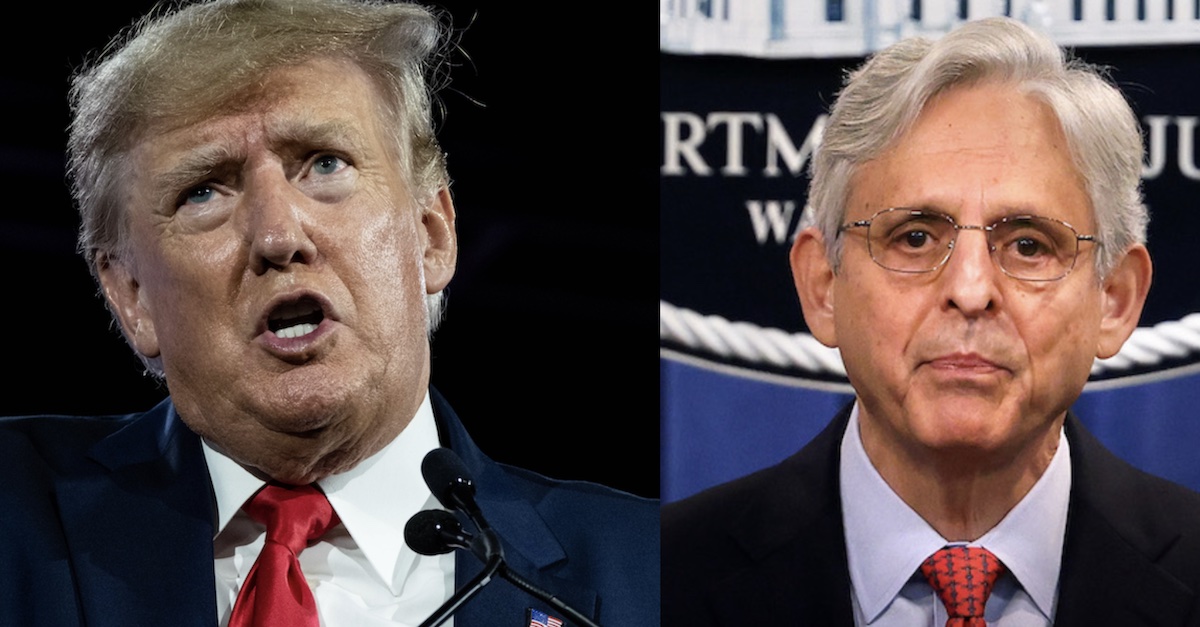
The special master overseeing former President Donald Trump’s spat with federal investigators over an increasingly small collection of documents on Monday told attorneys on both sides of the matter to forget about appearing in court for a hearing he scheduled for next month.
Special Master Raymond J. Dearie made the announcement in a brief minute order posted directly to the federal docket.
The order notes that “there are no matters requiring counsel to travel to Brooklyn for an in-person conference,” and justifies the last-minute change in the proceedings on “further review of the record.”
As Law&Crime previously reported, in early November of this year, Dearie set an aggressive schedule to end the dispute that included a since-shelved status hearing slated for Dec. 1, 2022. That hearing, the special master wrote at the time, was meant to “be an opportunity for the parties to elaborate upon their respective positions.”
Chief among the issues as Trump sees them, in recent court hearings, is a concern that the National Archives and Records Administration is a politically-motivated agency looking to exact political harm on the ex-president viz. the classified documents case.
The federal government, on the other hand, has as of late, been concerned with attempting to have Trump himself verify the inventory of the thousands of seized documents through a sworn affidavit.
Dearie’s latest order elides those issues in favor of direct questions about a very small number of documents. In lieu of arguing over various complaints and concerns, the special master wants the attorneys to explain if they do or don’t agree about “the categorization” of certain “records under the Presidential Records Act.”
The minute order refers directly to those documents in question – in a sense – by identifying them via the Bates numbering system:
In each case, the parties’ spreadsheet summarizing their respective categorizations and disputes reflects that the parties have a PRA dispute despite both sides categorizing the document as a “personal record.” a. Bates no. 156b. Bates nos. 476-79c. Bates nos. 3971-77d. Bates nos. 4017-18e. Bates nos. 12246-48f. Bates nos. 15167-68g. Bates nos. 17993-95h. Bates no. 179962. Do the parties dispute the PRA categorization of Bates no. 7017? The parties’ spreadsheet reflects differing categorizations but also lists the document as not being in dispute.
The special master also singles out some apparent discrepancies in previous filings entirely made by Trump’s attorneys:
Does Plaintiff assert executive privilege with respect to Bates no. A-054 and A-055 (documents 15 and 16 of the Filter Materials)? Compare ECF 160-1 at 2 (letter from Plaintiff’s counsel noting that “there is no further matter to resolve” as to each) with ECF 187-1 at 4 (subsequent letter from government reporting that each document is disputed based on Plaintiff’s assertion of executive privilege).
The large collection of documents culled from the FBI raid has been spit into several batches for review by an internal DOJ filter team referred to as “Filter A,” “Filter B,” and “Filter C” materials.
“[Trump] withdraws his initial claims of attorney-client privilege and attorney work product doctrine with respect to the following Filter A and C Materials,” government attorneys noted in a late October filing after reaching a compromise on two distinct document categories, noting, that in regard to the documents in those filter groups, “[Trump] previously did not assert attorney-client privilege or attorney work product doctrine.”
Monday’s order suggests a very limited decision on the overall disagreement could be in the offing. Dearie previously said that he anticipates issuing his report and recommendations as to the state of the disputed documents on Dec. 16, 2022.
[images via Seth Herald/Getty Images, Kevin Dietsch/Getty Images]